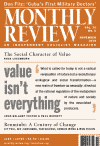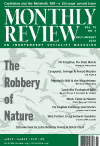Marxist Ecology

In many animal-rights circles, Karl Marx and a long tradition of Marxian theorists are to be faulted for their speciesist treatment of nonhuman animals and the human-nonhuman animal relationship. These criticisms typically neglect the larger historical conditions, intellectual influences, and debates out of which Marx’s treatment of the human-animal dialectic arose—even though this is crucial to any meaningful understanding of his thought in this area. In response, this article assesses the historical-intellectual background behind Marx’s arguments on humans and animals, placing it in the context of the influence exercised on his thought by Epicurus, Hermann Samuel Reimarus, Ludwig Feuerbach, Charles Darwin, and others. In the process, they explain how Marx’s view of animals in the world came to be integrated with his theory of metabolic rift and his critique of capitalism. | more…

Rereading Ted Benton and the Economic and Philosophic Manuscripts of 1844
In human-animal studies and critical animal studies, the most influential treatment of animalist Marxism and Marxist animalism has been developed by Ted Benton on the basis of his interpretation of Karl Marx’s work. This article focuses minutely on Benton’s argument and Marx’s Economic and Philosophical Manuscripts of 1844 (or Paris Manuscripts), refuting Benton’s contentions point by point and forcefully challenging the idea that Marx’s work was speciesist in orientation. | more…

The twenty-first century has resulted in a vast upsurge of ecological Marxism and ecosocialism more generally, building on the environmental critique of capitalism embedded in classical historical materialism. At the same time, it has also engendered opposing tendencies and approaches concerning how we understand relentless ecological destruction under capitalism. This issue is dedicated to exploring the theoretical advances, schools of thought, and debates on the left in regard to our world’s ecological crisis, which threatens the survival of humanity and is inescapable within the present capitalist system of production. | more…

The rapid advances in Marxian ecology in the last two decades have given rise to extensive debates within the left, reflecting competing conceptions of theory and practice in an age of planetary ecological and social crisis. One key area of dispute is the attempt by a growing number of radical environmental thinkers to deconstruct the labor theory of value in order to bring everything in existence within a single commodity logic. For many in Green circles, Karl Marx and a long tradition of Marxian theorists are to be faulted for not directly incorporating the expenditure of physical work/energy by extra-human nature into the theory of value. In response, this article argues that any form of analysis that seeks to eliminate the deep-seated dialectical contradictions between the natural form and the value form, as well as between the capitalist economy and the larger socioecological metabolism, fails to comprehend the complex, interdependent dialectics of nature and humanity. | more…

Geoengineering and Capitalism's Creative Destruction of the Earth
The dangers posed by climate change have inspired a desperate search for technological fixes in the form of geoengineering—massive human interventions to manipulate the entire climate or planet. But as long as the dominant strategy for addressing global warming remains subordinated to the ends of capital accumulation, any attempt to implement such schemes will prove fatal to humanity. | more…

A Letter to István Mészáros from Paul M. Sweezy, October 16, 1992
In October 1992, MR founding editor Paul M. Sweezy wrote the following brief letter, published here for the first time, to István Mészáros in response to an interview with Chris Arthur and Joseph McCarney that had just been published in Radical Philosophy. Sweezy saluted the critical significance of Mészáros’s argument on “the monstrous power of capital,” and the failure of many Marxists to perceive this problem in its full dimensions. He also affirmed the imperative of incorporating the ecological economics of Nicholas Georgescu-Roegen.

This special issue is dedicated to developing the ecological critique embodied in Marx’s theory of “metabolic rift.” Each article uses the metabolic rift perspective to uncover core contradictions of capitalism, as well as possible paths toward a new system—one that will meet human needs while protecting the earth and future generations. | more…

Capitalism and the Metabolic Rift
Marx’s notion of “the robbery of the soil” is intrinsically connected to the rift in the metabolism between human beings and the earth. To get at the complexities of his metabolic rift theory, it is useful to look separately at the issues of the robbery and the rift, seen as separate moments in a single development. | more…

Environmental Crisis and Metabolic Rift in Nineteenth-Century London
The accumulation of human excrement in nineteenth-century cities, particularly London, precipitated a historic environmental crisis—an aspect of the metabolic rift mostly overlooked in ecosocialist analysis. The solution that was finally adopted only shifted the problem out of sight, setting the stage for even greater crises in our time. | more…

Metabolic rift theory can deepen our understanding of the human microbiota—organisms living on and inside of humans—and the ways that capitalism has disrupted these microbial ecosystems, with serious consequences for our health. | more…

A Metabolic Analysis of Nutrient Loading
Increasing rates of nitrogen and phosphorus application have caused severe damage to aquatic systems, as rivers, streams, lakes, bays, and ocean systems have been inundated with nutrient runoff. Only by addressing the metabolic rupture in the soil nutrient cycle and the contradictions of capital can we begin to mend these land–sea rifts. | more…

In recent years ecological critiques of capitalism have deepened and multiplied, resulting in new debates over the conception, scope, and purpose of Marx’s value theory and its relation to the natural world. | more…











